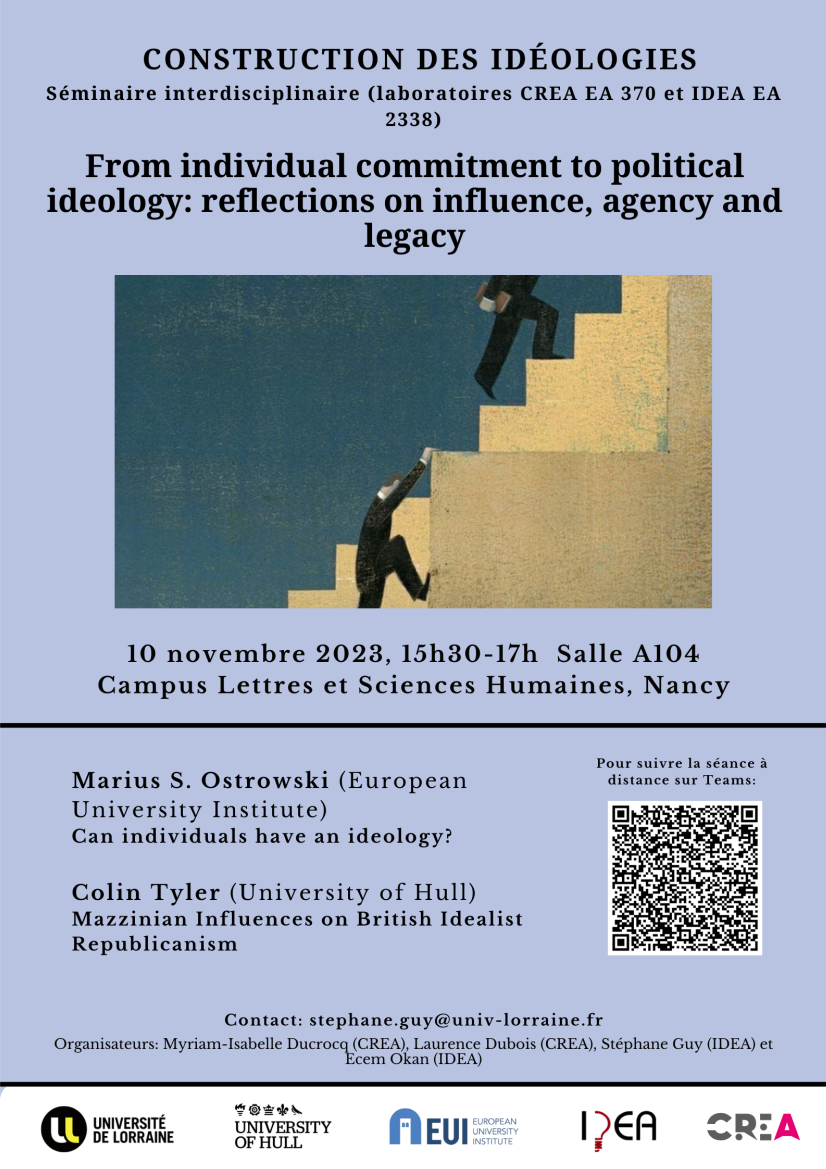Version française / Séminaires
- Libellé inconnu,
Séminaire "Construction des idéologies" : "From individual commitment to political ideology: reflections on influence, agency and legacy"

Co-organisé par le CREA (Université Paris Nanterre) et l'IDEA (Université de Lorraine)
le 10 novembre 2023
A distance : lien de connexion Teams
"From individual commitment to political ideology: reflections on influence, agency and legacy"
-
Marius S. Ostrowski (European University Institute)
"Can individuals have an ideology?"
The concept of ‘ideology’ is often treated as a collective phenomenon. Implicitly or explicitly, both social research and everyday thinking use ‘ideology’ to refer to the constellations and arrangements of ideas that we share with the various social groups we belong to. Whether as shared conventions, illusions, maps, policy preferences, or entire realities, ideologies rely on dynamics of alignment or agreement between us as individuals—dynamics these ideologies work to reinforce. Yet at the same time, ideologies also intimately shape how we individually think and behave as ‘independent’ social units. This paper asks how far we can use the concept of ‘ideology’ to understand our personal worldviews and lifestyles, and how we might apply the methods of ideology analysis at the individual rather than collective level. It examines the place of morphological analysis in capturing the core and peripheral elements that drive our thinking and behaviour, and how these aspects of ‘individual ideologies’ relate to the constitutive elements of ‘larger’ collective ideological traditions. It adds a comparative angle, exploring how our particular positions within the existing vertical, horizontal, geospatial, and intertemporal divisions in our societies influences the relationship between individual and collective ideologies. Finally, it argues that an individualised approach to ideology analysis opens up new avenues of enquiry for the history of social thought and social philosophy—capturing the worldviews of ‘canonical’ figures, but also analysing the underlying assumptions and commitments that guide all of our ‘ordinary’ thinking and behaviour.
-
Colin Tyler (University of Hull)
"Mazzinian Influences on British Idealist Republicanism"
This article explores the relationships between the political thought of Giuseppe Mazzini and the British idealists. Section one introduces the field, before section two sketches a background for the analysis of Mazzini’s influence on the British idealists, by surveying his influence on Benjamin Jowett, Algernon Swinburne and others. Sections three and four compare Mazzini’s with that of the foundational figure in British idealist social and political thought and practice, Thomas Hill Green. Section five reflects upon Mazzini’s reception by Arnold Toynbee, John MacCunn and David George Ritchie. The argument concludes, in section six, that although, in 1881, Toynbee had reasonable grounds for characterizing Mazzini as “the true teacher of our age”, this claim became increasingly unsustainable from the late 1880s onwards as evolutionary theory increasingly came to replace unorthodox forms of Christian faith as the basis of British and Italian political thought.
Marius S. Ostrowski is a political theorist, social scientist, historian of ideas, and policy researcher, specialising in the study of ideologies. His academic research focuses on the theory and history of social democracy and visions of European integration, while his policy research has addressed the integration of academic and vocational learning, European social policy, and Europe’s place in the global system. He has held research fellowships at the University of Oxford, the European University Institute, and the University of Nottingham, and he is Editor-in-Chief of the Journal of Political Ideologies as well as Executive Director of the Lifelong Education Institute. He is the author of Ideology (2022) and Left Unity (2020), and editor of the Eduard Bernstein Collected Works (2018–), and he has published on topics including Scottish independence, global democratic resilience, school behaviour policy, skills in strategic industries, and Universal Basic Income.
Colin Tyler is Professor of Applied Ethics and Political Theory, in the School of Politics and International Studies, at the University of Hull, UK. He is a Visiting Professor at IDEA at the University of Lorraine, France. Colin’s research focuses on British idealism, the New Liberalism, Jeremy Bentham, and common good politics, with a particular interest in dissent within free societies. He is the Director of Hull University’s Institute of Applied Ethics and the Founding Co-Director of the Centre for Idealism and the New Liberalism. Colin is also the convenor of the UK Political Studies Association British Idealism Specialist Group.
Mis à jour le 07 novembre 2023
Organisateurs :
Myriam-Isabelle Ducrocq (CREA, Université Paris Nanterre)
Stéphane Guy (IDEA, Université de Lorraine)
Ecem Okan (IDEA, Université de Lorraine)












